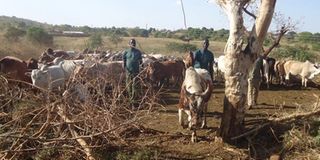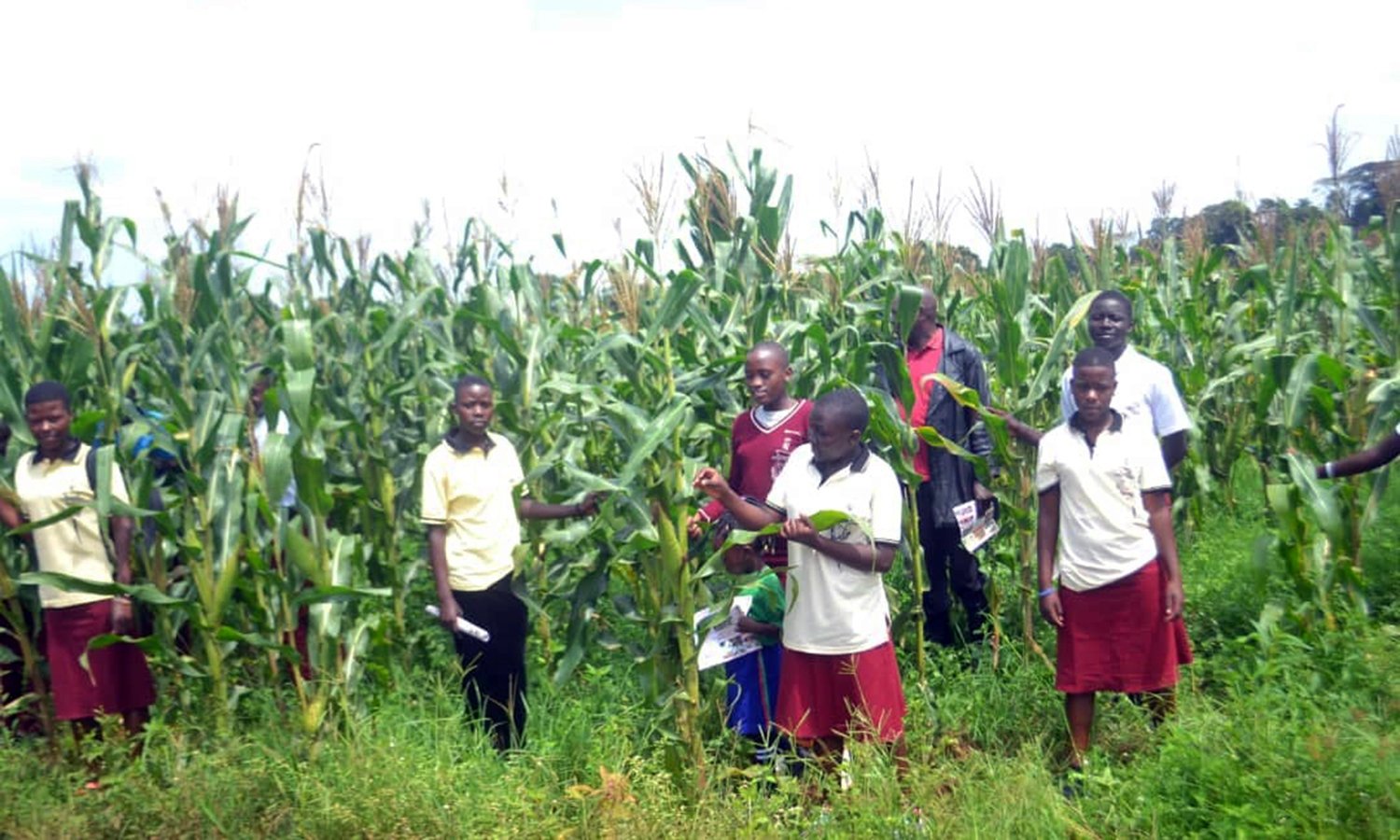Beef from stolen cows in butcheries

Spotted. ASTU police unit identifies a stolen bull in a Kraal, Napak District last year. Photo by Simon Peter Emwamu.
What you need to know:
Cases. In 2014, the police were only able to investigate 3,131 of the cases reported, and as a result, took 3,800 people to court, of whom 1,100 were convicted.
Cause. The thefts, police reports indicate, are rampant during big days such as Easter and Christmas when the prices of beef increase considerably.
Measure. To counter the rising crime, a special police directorate – the Anti Stock Theft Directorate was set up late last year. Mr Haruna Isabirye, the director of the unit, says Ankole has the highest cases of livestock thefts, followed by the Greater Masaka, North Lake Kyoga and Karamoja.
Challenge. In December last year, the Inspector General of Police, Gen Kale Kayihura, ranked theft of livestock among the top crime challenges after fraud in financial institutions and murders in the country.
KAMPALA. The next time you hit the butchery to buy beef, you could actually be buying a product of your friend or relative’s animal, if not your own, the Saturday Monitor has learnt.
This is after cattle theft has taken the country by storm. And the Widespread theft of cows across the country has forced the police to step up the fight against the crime.
Police figures for the year 2014 show that at least 7,768 cows were stolen across the country. But these are figures for only the cases that were reported to the police, meaning that since many people do not ordinarily report such cases, many more cows were stolen that year.
For that year, the police were only able to investigate 3,131 of the cases reported, and as a result, took 3,800 people to court, of whom 1,100 were convicted.
This newspaper has established that the highest number of cattle theft cases occur during market days across the country. Thieves steal cows overnight and transport them to market places kilometres away where they are bought – and sometimes slaughtered almost immediately.
The thefts, police reports indicate, are rampant during big days such as Easter and Christmas when the prices of beef increase considerably.
To counter the rising crime, a special police directorate – the Anti Stock Theft Directorate (ASTD) - was set up late last year.
Mr Haruna Isabirye, the director of the unit, says Ankole has the highest cases of livestock thefts, followed by the Greater Masaka, North Lake Kyoga and Karamoja.
The Ankole region covers districts of Kiruhura, Mbarara, Ntungamo, Ibanda and Isingiro while Greater Masaka covers districts of Gomba, Ssembabule, Rakai, Lyantonde, Masaka and Kalungu. North Lake Kyoga covers Lira, Apac and Oyam districts.
“Most of the cows stolen around Lake Kyoga and West Nile are transported to South Sudan where the market for goat’s meat and beef is high,” Mr Isabirye says.
An average heifer goes for Shs1.2 million in Uganda and about Shs2.5 million across the border in South Sudan.
The powerful also cry
In September 2016, for instance, Ms Doreen Kachwo, a police officer in Gomba District, told this newspaper that three people had been arrested for stealing cows from President Museveni’s farm at Kisozi. One of the suspects who had been arrested, she said, was an employee at the farm.
In the past five years alone – the latest being in September last year - at least 15 people have been arrested in connection with theft of cattle from President Museveni’s farm, about 100 kilometres west of Kampala.
In some areas like Teso, this newspaper has been told, farmers have resorted to chaining their animals to reduce the risk of theft.
In other parts of the country, many farmers, especially those with few animals, now keep them in their houses at night. Others sleep in turns to protect their animals. A few who have the means hire armed guards to secure the animals at night.
In Katakwi District, the Obalanga Sub-county chairperson, Mr Peter Okamo, says together with ASTD officers on Thursday afternoon, they recovered one heifer in Okiria Sub-county that had been taken by Karimojong warriors.
“It’s common that at such times when rains are returning and students are going back to school theft of cows is intensified,” he explains, hinting at the possibility of people selling off the animals to raise fees and money for farming.
Mr Moses Aupal, whose five cows were stolen in Ngariam recently, says when about 200 cows stolen from Katakwi, Sebei and Bulumbuli regions were recovered last month in Amudat District, they were called in to claim them, but many of them walked away without the animals after the Karimojong turned rowdy.
In Gulu District, police last weekend arrested seven people over planned theft of 31 cows from Omel B Village in Paicho Sub-county.
Those arrested include Mr Geoffrey Tumwine, a herdsman, and Joel Ocakacon, a livestock farmer.
Aswa regional police spokesperson Jimmy Patrick Okema said the duo had hired a Fuso truck to ferry the cattle. He said before their arrest, Mr Tumwine had already stolen 10 of the cattle and taken them to the kraal of his accomplice, Mr Ocakacon.
Ms Bena Atim, the deputy speaker Katakwi District, says they are investigating allegations of some people from Katakwi collaborating with Karimojong to steal cattle from Teso.
“It pains, raising an animal takes patience and in the event it is taken in a single day, the pain our people go through is immense,” she says.
Mr Abdul Waniola, a resident of Makudui village in Namanyonyi Sub-county, Mbale District, says in December last year, thieves broke into his kraal and took away the only cow he had.
Mr Seth Muboolo, also from the same village, says thieves took his animal when he had tethered it in a nearby field to graze during the day.
Ms Aisa Mutonyi, the woman councillor for Bukonde Sub-county, Mbale, says in a space of two months, her neighbours have lost several cattle.
Rampant crime
In December last year, the Inspector General of Police, Gen Kale Kayihura, ranked theft of livestock among the top crime challenges after fraud in financial institutions and murders in the country.
Mr Ibin Ssenkumbi, the former police spokesman of Rwizi region that has the highest cases of cattle theft, says 974 cases were reported in his area in 2016 alone.
“In the region, Kiruhura District had the highest cases followed by Isingiro District and Mbarara District,” Mr Ssenkumbi says.
Why cases are high
Mr Isabirye says livestock thefts are more pronounced on farms of absentee ranchers.
“In south western region, majority of the owners of the farms hire workers to look after their cattle. They only come once in many months to check on them. They find out that their animals were stolen months later,” he says, adding that by the time police officers are informed of the theft, it is difficult to follow up or carry out investigations.
In addition, the police say, tracing stolen cattle in absence of a livestock-branding regime is next to impossible.
The Mbale Municipality deputy speaker, Mr Yasin Wabomba, says the increasing cases of cattle theft is a result of failure by the victims to report to the police.
Police have also established that livestock thieves are becoming smarter; they also plan and get genuine movement permits, which they use to transport the stolen animals.
Cattle movement permits issued by the veterinary officers in districts only indicate the number of animals and the vehicle carrying them.
“They (permits) don’t give specific details of the animals. Criminals are using genuine permits to transport stolen cattle since the officers at the road checkpoints do not know details about specific animals being carried,” he says.
In the first week of January this year, the police intercepted a truck with more than 20 cows, goats and sheep that had been stolen from the farm owned by the Minister of state for Veteran Affairs, Lt Col Bright Rwamirama, in Mbarara District.
The suspects, who were intercepted at Buwama in Mpigi District, had misused a genuine movement permit to transport the cows for sale in city abattoirs.
Communities react
Many of the farmers who have zero-grazing farms often buy expensive breeds with the hope of making money from their products such as milk.
Losing them to thieves is devastating and sometimes even triggers a chain of crimes such as in May 2008 where three innocent people were killed on suspicion of stealing a cow at Kikunyu village in Butambala County then in Mpigi District.
Reported elsewhere.
The Sironko District police commander, Mr Wilfred Bagende, says they have set up village security teams to combat cattle theft.
Mr Isabirye says detaches manned by ASTD officers have been established in districts of Isingiro, Mbarara, Gomba, Kiruhura, Katakwi, Apac, Ssembabule, Amuria, Oyam, Nakaseke, Nakasongola and Kitgum to carry out snap checks and pursue cattle thieves.
Unlike other police units that concentrate on cases within their region, ASTD can crisscross districts looking for thieves.
Mr Isabirye gives an example: “There are more than 165 cows that were stolen in Gomba District. The officers of ASTD walked on foot tracking the stolen cows up to Mubende District.”
How cows are stolen
Mr Ssenkumbi says the commonest method of stealing cows is through connivance between cattle keepers and thieves from urban areas. He says thieves come at night and pick a few head of cattle from each farm, which they herd for miles and then load onto trucks before driving off. In western region, the thieves’ main route is Bushenyi District through Mitooma District to Kasese District where there is a big cattle market. From Greater Masaka region, stolen livestock is transported to Kampala abattoirs where it is sold and slaughtered. The Katonga region police spokesman, Mr Phillip Mukasa, says thieves target one or two cows which they slaughter near where they have stolen them and then bundle the meat in cars. The meat will end up in butcheries in urban areas. “There have been cases where they strangle goats and pack their carcasses in the car. When these cases are investigated, they end up at (the doorstep of) someone at the farm, who connived with the thieves,” Mr Mukasa says.
Additional reporting by Simon Peter Emwamu, Julius Ocungi, Fred Wembede Oliver Mukaaya & Rajab Mukombozi



